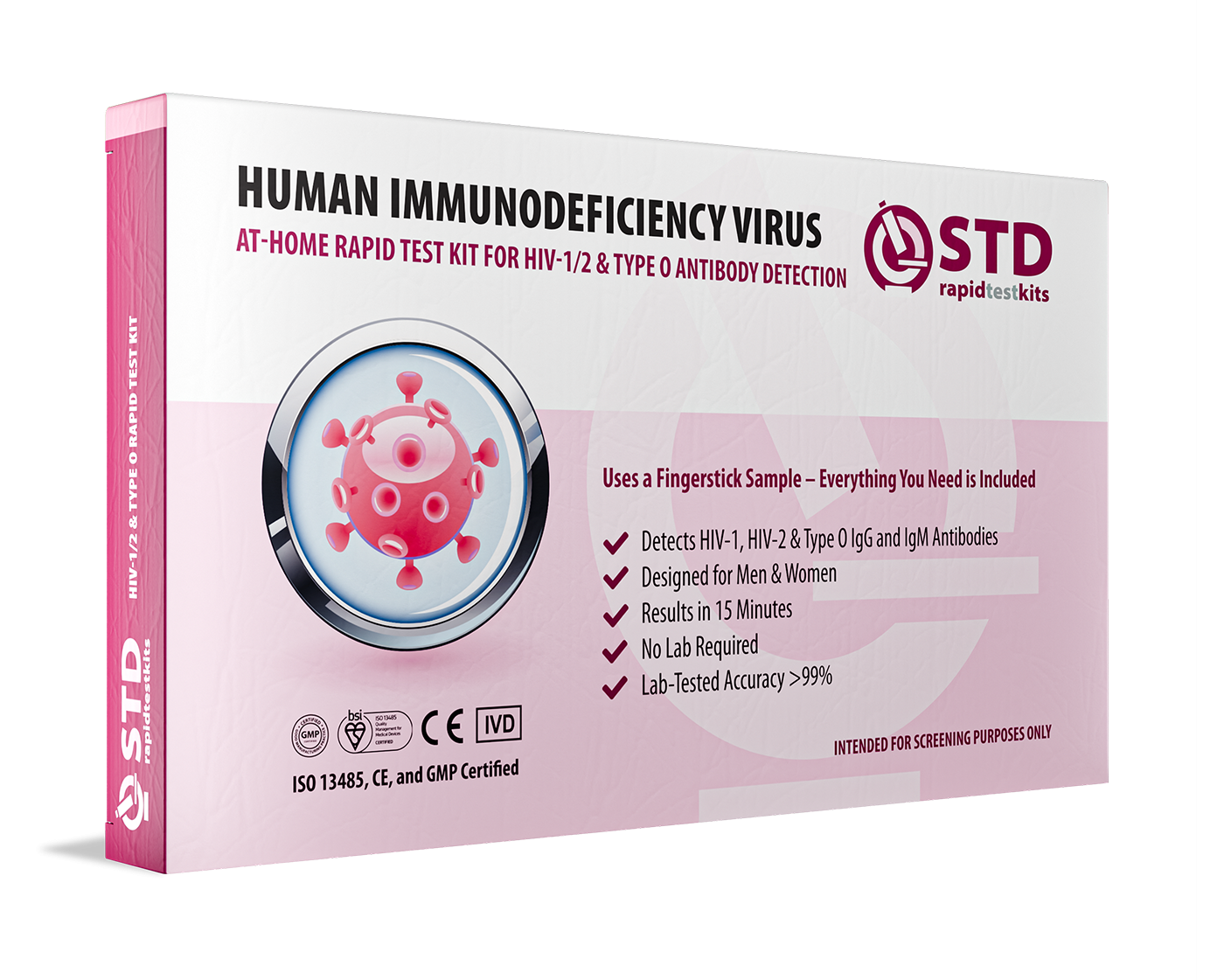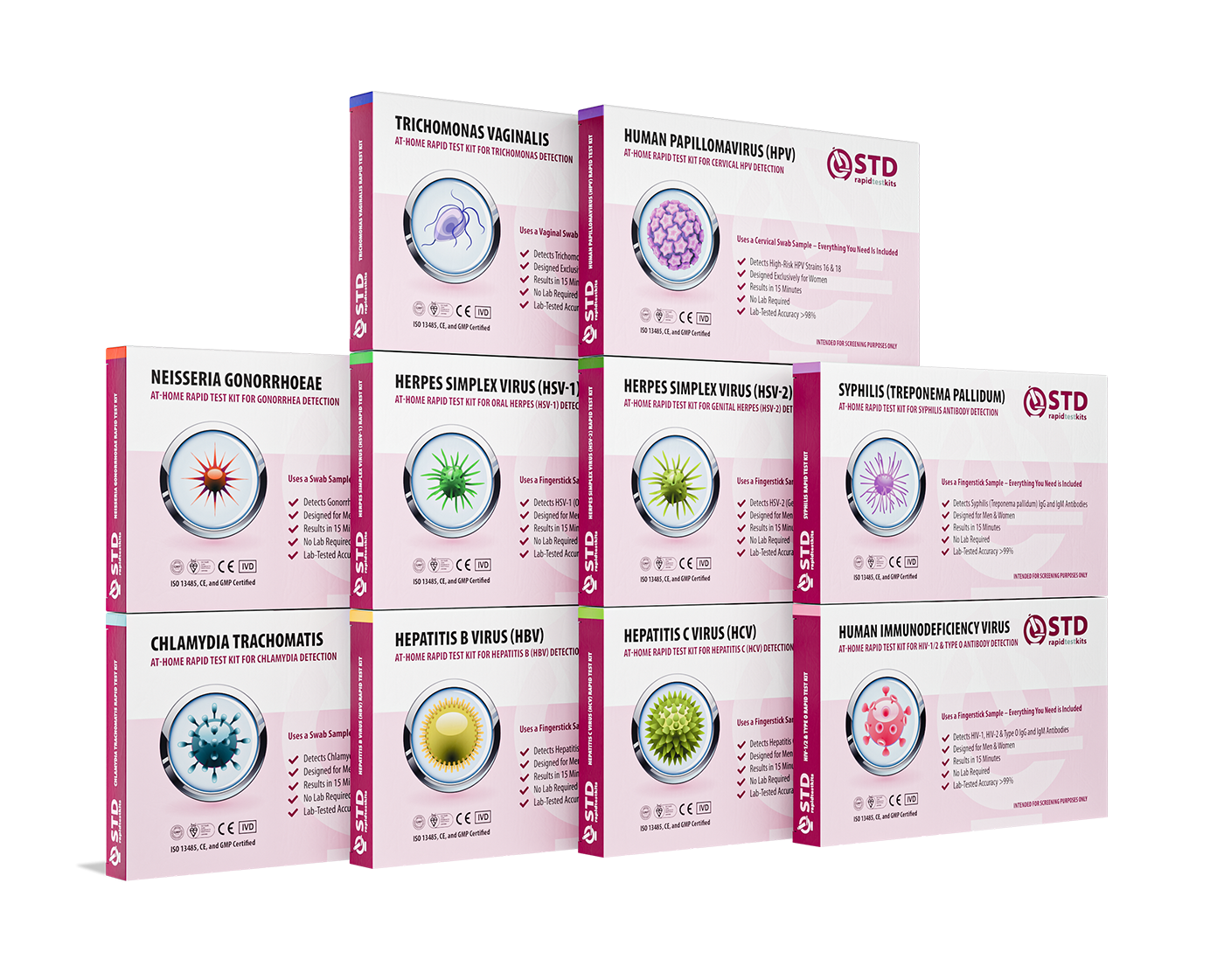Is It Just a Virus or Could It Be HIV Here’s How to Tell
HIV's Effect on the Body, It’s Not Just an Immune Problem
HIV (Human Immunodeficiency Virus) is notorious for attacking the immune system, specifically the CD4 T-cells that are critical in helping the body fight infections. But that’s just the beginning.
Once the virus invades, it replicates rapidly and systematically damages not just the immune defenses, but also the entire infrastructure of the body. Over time, even with treatment, people living with HIV may deal with a host of complications: neurological, gastrointestinal, cardiovascular, dermatological, and more.
Why? Because HIV isn’t a localized infection, it travels through your bloodstream, embedding itself in reservoirs and triggering chronic inflammation. And chronic inflammation is a silent killer.
If HIV remains untreated, this inflammation becomes a long-term process that chips away at organ systems. But even when viral load is undetectable due to antiretroviral therapy (ART), the ghost of inflammation often lingers.
The key takeaway? HIV is not “just” a virus, it’s a systemic wrecking ball, and its side effects don’t stay in a neat little box.
The Unexpected Side Effects , What HIV Really Does to Your Body
Let’s talk specifics. Here’s how HIV affects different parts of your body, and yes, these are the real reasons you’re exhausted, achy, or feeling unlike yourself.
The Brain: Cognitive Chaos
HIV can penetrate the blood-brain barrier, which means it doesn't stop at your immune system, it goes straight for your mind.
- HIV-Associated Neurocognitive Disorder (HAND): This condition ranges from mild forgetfulness and trouble concentrating to full-blown dementia. Even people on ART can experience cognitive decline.
- Mood disorders: Depression and anxiety are extremely common in people living with HIV, partly due to neurochemical changes the virus induces.
- Peripheral neuropathy: Tingling, burning, or numbness in the hands and feet can become chronic due to nerve damage.
The Heart: Silent Sabotage
HIV dramatically increases the risk of cardiovascular disease, even in young people.
- Chronic inflammation damages blood vessels, accelerating plaque buildup and atherosclerosis.
- ART side effects (like changes in cholesterol and fat distribution) also contribute to higher risk of heart attacks and strokes.
The Immune System: Ground Zero
CD4 cell depletion leaves your body vulnerable to:
- Opportunistic infections like tuberculosis, pneumonia, and candidiasis.
- Cancers, especially Kaposi sarcoma and non-Hodgkin lymphoma, which flourish when the immune system is compromised.
The Skin: A Telltale Canvas
Skin often reveals what the immune system is hiding.
- Rashes, lesions, and ulcers are common. Conditions like seborrheic dermatitis or psoriasis may flare uncontrollably.
- Herpes simplex outbreaks (cold sores and genital herpes) can become more frequent and severe.
The Gut: Unrelenting Disruption
Your gastrointestinal tract is one of HIV’s early targets.
- Chronic diarrhea, nausea, and abdominal pain often show up even before an HIV diagnosis.
- Damage to gut-associated lymphoid tissue (GALT) weakens nutrient absorption and immunity.
Bones and Joints: Accelerated Aging
Yes, HIV accelerates aging, especially in your bones.
- Increased risk of osteopenia and osteoporosis even in people under 50.
- Joint pain, stiffness, and arthritis-like symptoms are not uncommon.
Mental Health: Invisible but Intense
- Beyond neurological damage, HIV impacts emotional health.
- Many patients suffer from adjustment disorder, PTSD, or suicidal ideation, particularly after diagnosis or during flare-ups.
Check Your STD Status in Minutes
Test at Home with RemediumHIV Rapid Test Kit

 For Men & Women
For Men & Women Results in Minutes
Results in Minutes No Lab Needed
No Lab Needed Private & Discreet
Private & DiscreetOrder Now $33.99 $49.00
What Are the Risks If You Ignore It?
Let’s get one thing straight: untreated or poorly managed HIV doesn’t just simmer in the background. It evolves, into a series of painful, terrifying, and potentially fatal complications.
Rapid Disease Progression
Without ART, HIV can progress to AIDS in under 10 years, or much faster in some cases. This is when the CD4 count drops below 200, and the immune system is no longer able to fight off infections.
Opportunistic Infections Take Over
This includes:
- Pneumocystis pneumonia (PCP) – a fungal infection that can suffocate.
- Cytomegalovirus (CMV) – can blind or paralyze if untreated.
- Cryptococcal meningitis – a brain infection with a 20–30% fatality rate.
Life-Threatening Cancers
Kaposi sarcoma and aggressive lymphomas become far more likely with unmanaged HIV. These aren’t your garden-variety cancers, they grow fast and spread viciously.
Irreversible Organ Damage
Long-term HIV infection leads to scarring and dysfunction in:
- Kidneys – HIV-associated nephropathy (HIVAN) can lead to kidney failure.
- Liver – particularly if co-infected with hepatitis B or C.
- Lungs – from chronic bronchitis to pulmonary hypertension.
How to Fight Back , Solutions that Actually Work
Here’s the silver lining: we can fight HIV, and win. But it takes action, vigilance, and the right tools.
Start With Testing
No diagnosis, no defense. An at-home test from STD Rapid Test Kits can be your first step, quick, private, and delivered to your door. Because waiting in fear isn’t bravery. Knowing is.
Begin or Maintain ART Immediately
Antiretroviral therapy reduces the viral load to “undetectable” levels, so low it can’t be transmitted sexually (yes, Undetectable = Untransmittable). ART also prevents many of the long-term complications listed above.
Monitor Your Body Closely
- Keep tabs on CD4 count and viral load every 3–6 months.
- Watch for early signs of cognitive decline, gastrointestinal issues, or fatigue.
- Get regular screenings for STIs, cancers, and cardiovascular risk factors.
Prioritize Your Mental Health
Therapy, support groups, and psychiatric medications are not optional. HIV affects more than just your body, it takes a toll on your identity, confidence, and relationships.
Check Your STD Status in Minutes
Test at Home with Remedium7-in-1 STD Test Kit

 For Men & Women
For Men & Women Results in Minutes
Results in Minutes No Lab Needed
No Lab Needed Private & Discreet
Private & DiscreetOrder Now $129.00 $343.00
For all 7 tests
By the Numbers , What the Data Tells Us About HIV Side Effects
Numbers don’t lie. And when it comes to HIV, the statistics are both sobering and motivating.
- Over 39 million people worldwide were living with HIV in 2023, according to UNAIDS.
- Studies show that 60–70% of people with HIV experience some form of neurocognitive impairment, even with treatment.
- Cardiovascular disease risk is 1.5 to 2 times higher in HIV-positive individuals, regardless of ART status.
- The CDC reports that about 1 in 4 people with HIV also suffer from significant mental health conditions, many of which go untreated.
- Up to 50% of people with HIV may experience gastrointestinal symptoms regularly, impacting nutrition, absorption, and medication compliance.
- Long-term ART can lead to bone density loss, with a 6.4% decrease in spine BMD (bone mineral density) after just one year on treatment, according to a 2022 NIH study.
This data paints a clear picture: Even when HIV is “controlled,” its effects ripple throughout the body. Ignoring symptoms or skipping tests isn’t an option.
Real Stories, Real Struggles , and Survival
Let’s meet Tasha, a 34-year-old artist from New Orleans. She was diagnosed in 2019 after a routine STD panel.
“I was in shock,” she said. “I felt fine. I thought, no way I’m sick.” But within months, she began to notice strange things: skin outbreaks that wouldn’t heal, crushing fatigue, and memory problems. “I forgot my nephew’s birthday. I’ve never done that.”
It wasn’t until she started ART and joined a local HIV support group that she began to feel like herself again. “The meds gave me my body back. The community gave me my soul.”
Then there’s Jorge, a 42-year-old teacher who delayed testing for years because of stigma. By the time he was diagnosed, his CD4 count was dangerously low, and he’d already developed oral thrush and severe nerve pain.
“I thought I was just stressed. Turns out my body was screaming.”
These are not exceptions, they’re echoes of what so many endure in silence.
HIV Through the Ages, A Historical Perspective
Back in the 1980s and early 90s, an HIV diagnosis was essentially a death sentence. The virus destroyed immune systems with terrifying speed. Side effects weren’t even part of the conversation because few people lived long enough to see them.
By the mid-90s, with the advent of ART, everything changed. HIV became a “chronic manageable condition,” and suddenly, people lived long enough to face new challenges: heart disease, cancer risks, mental health breakdowns. The fight shifted from immediate survival to long-term quality of life.
Today, thanks to science and awareness, HIV-positive individuals can live decades, but the side effects of both the virus and the medications have evolved, too. Now, we’re not just fighting HIV itself, but the wear and tear it causes over time.
What’s Next? The Future of HIV and Side Effect Management
Innovation in HIV care is moving at warp speed.
- Long-acting injectables are changing how ART is delivered, eliminating daily pills for some.
- Dual therapy regimens are replacing triple therapies, reducing the risk of side effects.
- Gene editing (CRISPR) is being studied as a way to potentially eradicate latent HIV from the body.
- Digital symptom tracking is helping people manage side effects in real time, with AI suggesting interventions or doctor alerts.
Practical Ways to Protect Your Health
Knowledge is step one. Action is step two. Here’s how to apply this information right now:
- Get tested, even if you feel fine. Especially if you’ve had unprotected sex, multiple partners, or symptoms you can’t explain. STD Rapid Test Kits offers discreet, fast, and accurate HIV testing from home.
- Track your symptoms. Start a journal. Note changes in sleep, mood, skin, energy, and memory.
- Build a care team: Primary doctor, infectious disease specialist, therapist, and a support network.
- Stay consistent with meds: Missing doses fuels viral resistance and increases long-term complications.
- Speak up: If something feels off, don’t dismiss it. Side effects are your body’s warning sirens.
HIV's Impact Across Industries
HIV doesn’t exist in a vacuum, it affects healthcare systems, workplaces, education, and tech innovation.
- In healthcare, the demand for HIV-specialized care is growing rapidly, as are mental health services tailored to HIV patients.
- In the workplace, employers are now required to make accommodations for those experiencing HIV-related side effects under ADA protections.
- Tech companies are developing wearable devices to monitor ART compliance, fatigue levels, and mood changes in real-time.
- Pharmaceutical industries are investing billions into HIV cure research, while also developing drugs with fewer side effects.
The impact of HIV is systemic, and so are the solutions.
Check Your STD Status in Minutes
Test at Home with Remedium10-in-1 STD Test Kit

 For Women
For Women Results in Minutes
Results in Minutes No Lab Needed
No Lab Needed Private & Discreet
Private & DiscreetOrder Now $189.00 $490.00
For all 10 tests
“I Never Thought It Would Be Me” , Testimonials That Hit Home
“When I started losing weight, I thought it was stress. But the fatigue? The night sweats? I knew something was wrong.”
– Ryan, 29, diagnosed in 2021
“Antiretrovirals gave me life, but I had no idea they’d also give me nerve pain and insomnia. I had to adjust and advocate for myself. That saved me.”
– Dina, 45, on ART since 2010
“The rash wouldn’t go away. Neither did the brain fog. It wasn’t until I got tested and found out I had HIV that everything clicked.”
– Anonymous, Reddit HIVSupportThread
The 6 Biggest Myths About HIV Side Effects, Busted
- Myth #1: If I’m on meds, I won’t have any side effects.
False. Many still deal with cognitive, metabolic, or emotional symptoms even with ART. - Myth #2: You only get symptoms when HIV becomes AIDS.
Wrong. Symptoms can appear early, especially fatigue, rashes, diarrhea, or swollen lymph nodes. - Myth #3: You can’t live a normal life.
You can, with the right treatment, monitoring, and mindset. - Myth #4: All weight loss is healthy.
Rapid, unexplained weight loss could be wasting syndrome, a sign of advanced HIV. - Myth #5: You’ll know if you have HIV because you’ll feel sick.
Many people feel fine for years while HIV silently damages their body.
FAQs
1. Can HIV cause brain fog and memory loss?
Yes. HIV can affect the central nervous system directly, causing cognitive dysfunction known as HAND.
2. Why am I always tired even though I’m undetectable?
Fatigue is a common lingering symptom, possibly from inflammation, meds, or co-infections.
3. Is weight loss a symptom of HIV?
Absolutely, especially in later stages or during high viral activity. It may signal wasting syndrome.
4. Can ART cause side effects too?
Yes. While ART saves lives, it can cause metabolic changes, fatigue, sleep disruption, and more.
5. Are skin rashes from HIV permanent?
Not usually, but they may persist or recur if the immune system is compromised.
6. Will I die younger if I have HIV?
Not necessarily, lifespan can be near-normal with early diagnosis and consistent ART.
7. Can I still get STDs if I’m on HIV meds?
Yes. ART doesn’t protect you from other STDs like syphilis, gonorrhea, or herpes.
8. Can HIV affect my sex drive?
Yes, due to hormonal changes, mental health, and side effects of medication.
9. Is diarrhea from HIV or the meds?
Could be both. The virus affects the gut, and some ART regimens irritate the GI tract.
10. Can I test for HIV anonymously?
Absolutely. STD Rapid Test Kits offers discreet at-home options with fast results.
Your Body Is Talking, Are You Listening?
HIV isn’t quiet. Even when the virus is under control, its ripple effects are relentless. From your skin to your bones, brain to gut, the body remembers the fight. And if you’re not paying attention, those subtle side effects can turn into life-altering complications.
But here’s the thing: you are not powerless. Every test you take, every pill you remember, every weird symptom you ask your doctor about, that’s you reclaiming control. You’re not just surviving HIV. You’re outsmarting it.
So don’t wait for the crash. Listen to the whispers, the aches, the fog. Get tested. Get treated. And if you’re scared? That’s okay. Do it anyway. Your body is begging for clarity. Give it the answer it needs.
Sources
1. Reddit HIV+ Support Community
2. HIV Basics










